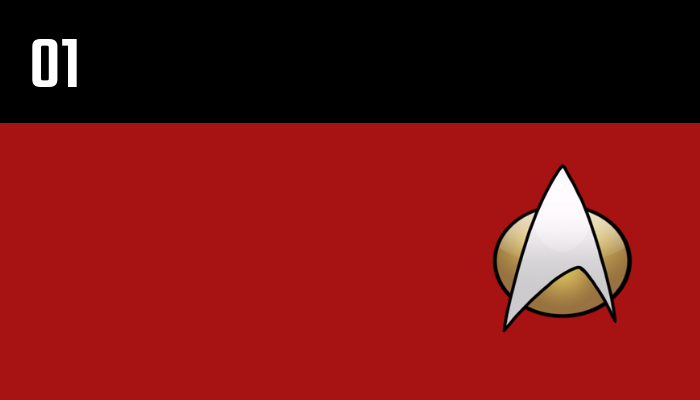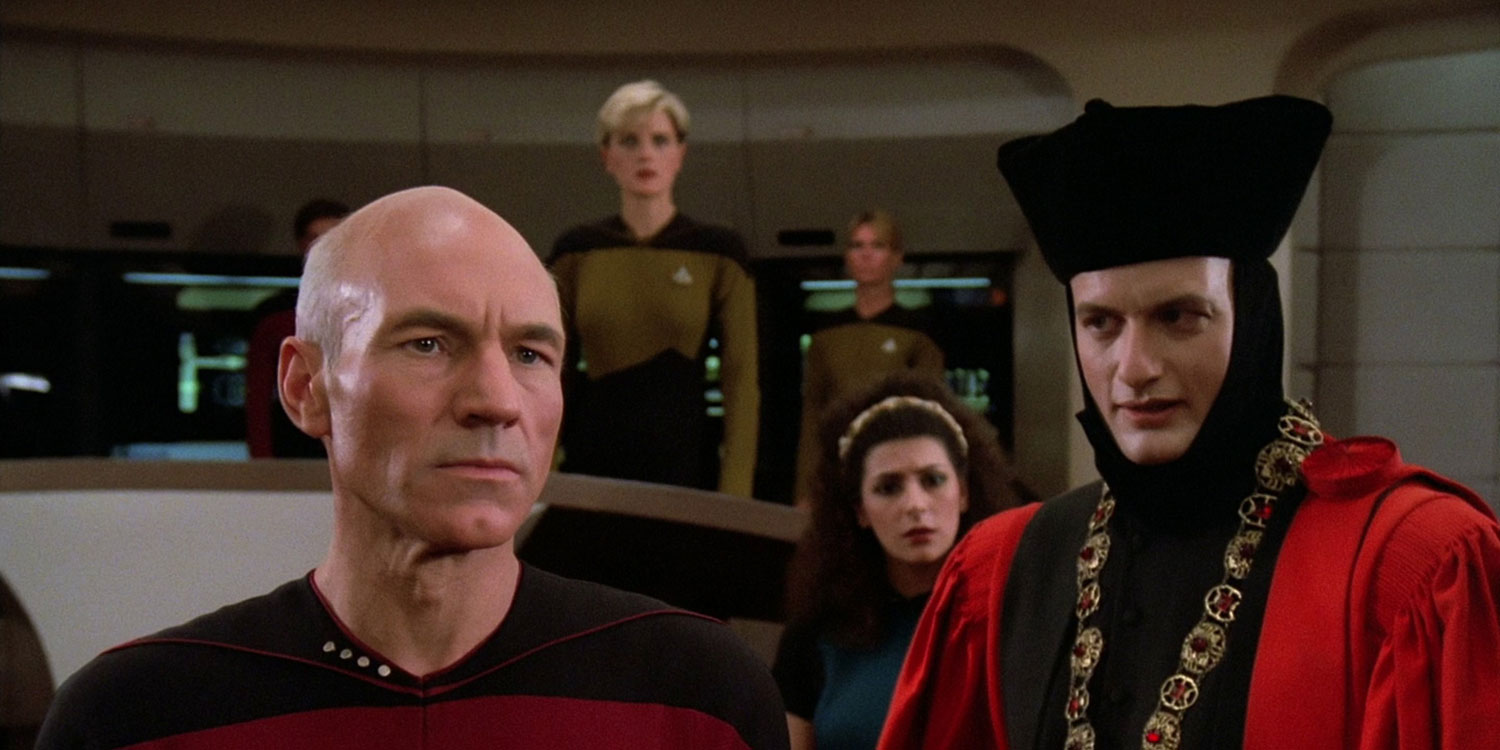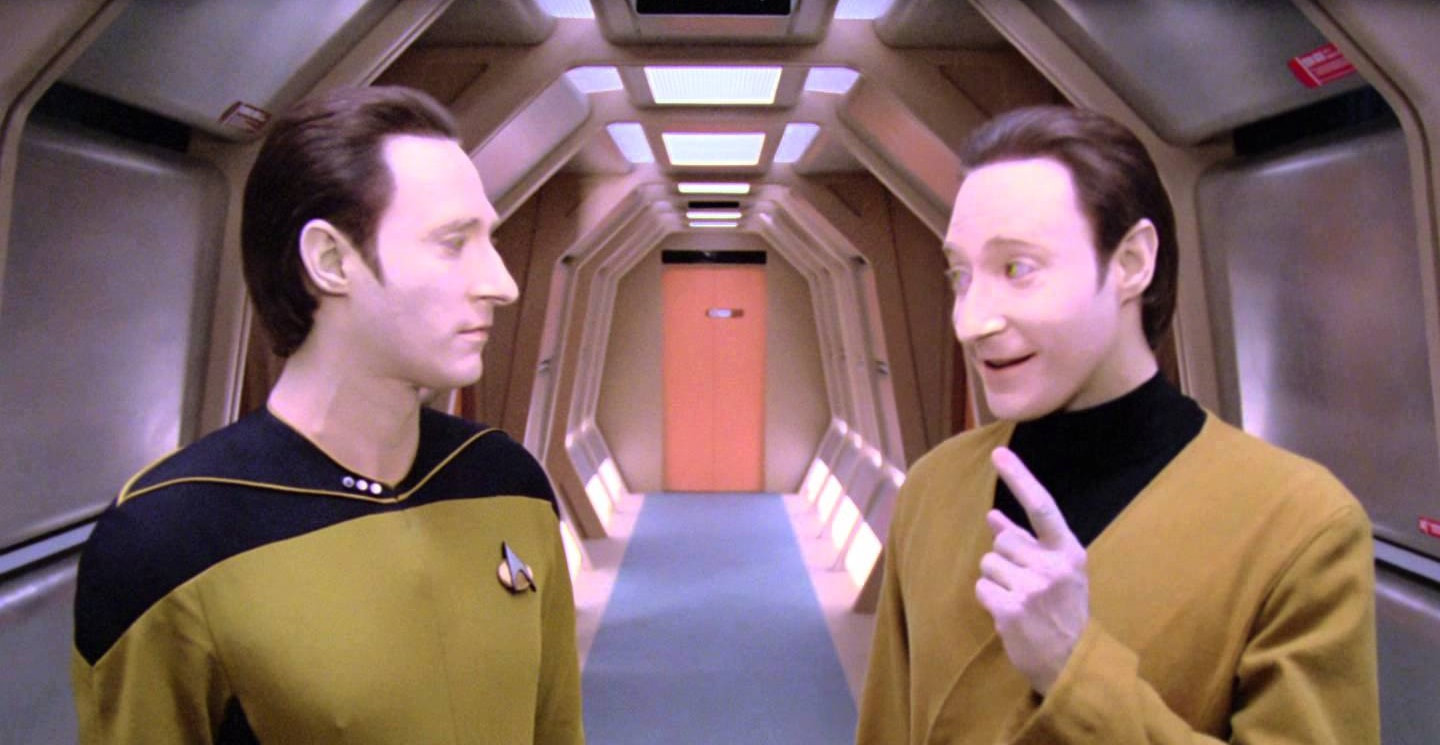|
As you might have gathered from my list of top 10 Original Series episodes, I've begun watching the Star Trek TV series in earnest. While I took the coward's way out with TOS and watched only around 30 episodes total, with the remaining series I'll be in for the long haul. Fortunately, that's barely more than 600 episodes! Next up, of course, is Star Trek: The Next Generation which premiered in 1987 with a first season of 26 episodes. These stories focus on the travels of the USS Enterprise-D in 2364, nearly 100 years after the original voyages of Kirk's Enterprise. The production and reception of this first season has been well-documented elsewhere, but it's worth reiterating that The Next Generation had a troubled beginning. The 1988 writer's strike caused problems towards its end, but the first half of the series is also plagued by sub-standard episodes. The cast had yet to figure out their characters, acting could be dubious, and Gene Roddenberry's demands were restrictive. With that being said, I was surprised at the high quality of a handful of episodes in the season's second half. Patrick Stewart is also reliably excellent in his iconic role as Captain Jean-Luc Picard - he anchors the series even when other characters aren't yet up to scratch. Without further ado - engage! S1E1/2 "Encounter at Farpoint" (4/10) The newly-built Galaxy-class Enterprise must explore an oddly perfect station built by the Bandi people in this most inauspicious series opener. The plot is desperately undramatic and padded out with filler scenes to hit 90 minutes. Character introductions are adequate, but trying to introduce Q and the whole new crew was another mistake. S1E3 "The Naked Now" (5/10) The crew descend into intoxicated madness in this loose sequel to the TOS episode "The Naked Time". It's entirely too early in the series to deploy this idea because the characters aren't established. Some of the humour works quite well, so this is at least a little more effective than episode 1. S1E4 "Code of Honor" (3/10) The choice of an entirely African-American cast of aliens codes a fairly benign diplomatic culture clash episode as something much more offensive. Widely reviled for this reason, and probably fairly so. The supremely tepid climactic death duel surely reflects the cast and crew's embarassment at being involved. S1E5 "The Last Outpost" (5/10) The Enterprise crew make first contact with some belligerent Ferengi, but both ships are in the grip of a third party. Begins promisingly, but falls largely flat when the mystery is explained in a drab fashion. It's easy to see why the idea that the comical, implike Ferengi could be lasting antagonists was quickly dropped. S1E6 "Where No One Has Gone Before" (5/10) The ship is warped to the edge of the universe, and apparently it's a kind of magic. The crew have virtually no agency in this episode, and are largely reduced to the status of bystanders. On the plus side, Stanley Kamel puts in a great guest actor spot as pompous engineer Kosinski and the visual effects are good. S1E7 "Lonely Among Us" (4/10) An attempt to reconcile two enemy alien species provides a silly comic backdrop for the real story here, about an electrical entity that possesses one crew member after another. The episode has a cheap, thin feel and that comic backdrop is ironically the only part that nearly works - partly due to interesting prosthetics. S1E8 "Justice" (4/10) After an opening which introduces the ludicrous scantily-clad Edo people and their idyllic world, this episode briefly threatens to become interesting in its discussion of the Prime Directive. In the end, Picard and his crew find a frustratingly easy solution, which sadly does not involve Wesley Crusher's execution. S1E9 "The Battle" (3/10) The Ferengi return, this time to torment Picard with the memory of a battle with them when he was captain of the USS Stargazer. Yet another episode which falls almost flat on its face when the initial mysterious setup is explained - the only thing holding it together is Patrick Stewart's committed performance and one or two worthwhile visual effects. S1E10 "Hide and Q" (4) John de Lancie returns as Q, and begins to become more interesting in the role in this episode. When Q offers Riker godlike powers, the results are predictable and the story feels half-formed and uninteresting. However, Q's philosophical exchange with Picard is the show's first worthwhile conversation, and Worf gets to briefly fight some aliens in Napoleonic uniforms - so there's that. S1E11 "Haven" (4/10) To its credit, this episode does have two interestingly interconnected plots - but its main one, about Troi's impending arranged marriage, is most unexciting. Robert Knepper makes a surprising early-career appearance as Troi's husband-to-be. Over two thirds of the way through its first season, the show is still treading water with this adequate potboiler. S1E12 "The Big Goodbye" (5/10) For the first time in several episodes, the series actually threatens to become good. This is the first true holodeck episode, and while it isn't used particularly effectively this detour into 1941 San Francisco does relieve the monotony of the series somewhat. Sadly, the plot is full of holes and simply shrugs off the fictional Dixon Hill mystery when it outlives its usefulness. S1E13 "Datalore" (6/10) Set your faces to stunned, it's an actual good episode! It's been a long time coming, but finally we have a story which often delivers on its promise. Data is taken to visit the planet of his creation, but upon reassembly his "brother" proves to have some dangerously human traits. Ironically given the emphasis on Data, the plot isn't actually very logical but there's humour and some real excitement. S1E14 "Angel One" (3/10) After its first truly worthwhile episode, the series comes crashing down with easily the worst outing since "Code of Honor". The hamfisted attempt to use gender relations to comment on apartheid falls in spectacular fashion, coming across as irredeemably sexist - fatal, for a show touted as progressive. Even leaving this aspect aside, it's a flat-out boring potboiler on another sterile, anaemic planet. S1E15 "11001001" (7/10) The best episode yet begins with an innocuous visit to Starbase 74, where benign and advanced aliens feel compelled to hijack the enterprise. Again, there are fairly major logical gaps in the plot but a combination of good effects, holodeck intrigue, and strong performances deliver dramatic results. This is an episode worthy of the Star Trek name. S1E16 "Too Short a Season" (6/10) Unusually, this episode is thoroughly dominated by its guest star. Clayton Rohner is over the top as geriatric Starfleet admiral Mark Jameson, but his story is interesting - touching on ageing, guilt and his badly flawed quest for redemption. Notably, the episode features the series' very first phaser battle, as an away team is ambushed by the troops of the hostage-taking governor of Mordan IV. S1E17 "When the Bough Breaks" (5/10) A decent but unspectacular episode which again indulges the idyllic planet trope. An advanced culture has been rendered sterile, and abducts children from the Enterprise as a means to rejuvenate their society. Stewart's enraged performance is excellent, but the episode's environmental subtext is not only dated but also delivered too late in the story to have an impact. S1E18 "Home Soil" (6/10) The crew visit a planet undergoing Federation terraforming and encounter a non-organic, computer-like lifeform that declares humans to be "ugly bags of mostly water". Besides this immortal phrase, the episode is noteworthy for a scene in which Data is almost fried by a laser and for its unusually serious, hard sci-fi script. It's a bit too talky, but a good story nonetheless. S1E19 "Coming of Age" (7/10) Another series highlight. Comprises two almost completely unconnected stories, albeit both themed around being tested - Wesley takes the Starfleet Academy entrance exam, while the crew are subjected to a bruising investigation. All the performances are excellent, and the references to past and future events provide a welcome sense of continuity. S1E20 "Heart of Glory" (7/10) Worf has been badly neglected up to now, but that ends with "Heart of Glory". An encounter with two rogue Klingons prompts an examination of Worf's backstory, Klingon culture, and the question of integration. After a slow start, this very good episode delivers intrigue, action, and exposition. Again, with its second half the series is beginning to flex its muscle and demonstrate its potential. S1E21 "The Arsenal of Freedom" (5/10)
The Enterprise visits a planet known for its advanced weapons production and the concept is interesting - but the episode is only so-so. There are three good guest stars, but none of them are given particularly worthwhile roles and the story lacks a real climax. Still, we at least get to see LaForge struggle with the demands of commanding the ship . S1E22 "Symbiosis" (5/10) Another passable episode. The story's "twist" - that a much-needed medicine is actually an addictive narcotic - is obvious right from the outset which drains the episode of tension. With little excitement, this one simply ticks over predictably until it reaches a good ending which is morally complex. Guest actor Merrick Butrick, a veteran of Star Trek II, would sadly pass away shortly after this. S1E23 "Skin of Evil" (2/10) What were they thinking? A truly shambolic episode, and the worst of the series so far. Not only is Tasha Yar's death handled appallingly, but the episode has nothing else to offer but a cheap monster-of-the-week with abandonment issues. Hilariously, Yar's memorial gathering takes place in a holodeck simulation that looks just like the default Windows XP background. (Worst Episode) S1E24 "We'll Always Have Paris" (5/10) This episode marks the first in which time travel has a bearing on the story, but the concept is used to barely any effect. Similarly, Picard's relationship with an old flame (and wife of a time-meddling scientist) is a misfire. The episode was explicitly modelled on Casablanca, which was really setting itself up for a fall. Fortunately, the climactic scene in which Data saves the day is excellent. S1E25 "Conspiracy" (8/10) Over some hostility, writers pushed the series outside its comfort zone with this episode and the results are superb. Picking up threads from "Coming of Age" six episodes ago, this story summons a brilliantly sinister atmosphere as a race of malevolent parasites work to seize control of Starfleet. A plot of this significance might have benefited from more episodes, but in any case this is gripping stuff. (Best Episode) S1E26: "The Neutral Zone" (6/10) Significantly affected by the 1988 writer's strike, this makes for an unusual series finale. Originally, the Borg were to appear but his was nixed. Instead, what would generally be the B plot - comic relief about cryonically frozen 20th century humans - takes up much of the runtime. Fortunately, this plot works well and the first appearance of the Romulans in the series is suitably intimidating, if brief.
0 Comments
Your comment will be posted after it is approved.
Leave a Reply. |
About
I write about classic science fiction and occasionally fantasy; I sometimes make maps for Doom II; and I'm a contributor to the videogames site Entertainium, where I regularly review new games. Categories
All
|



